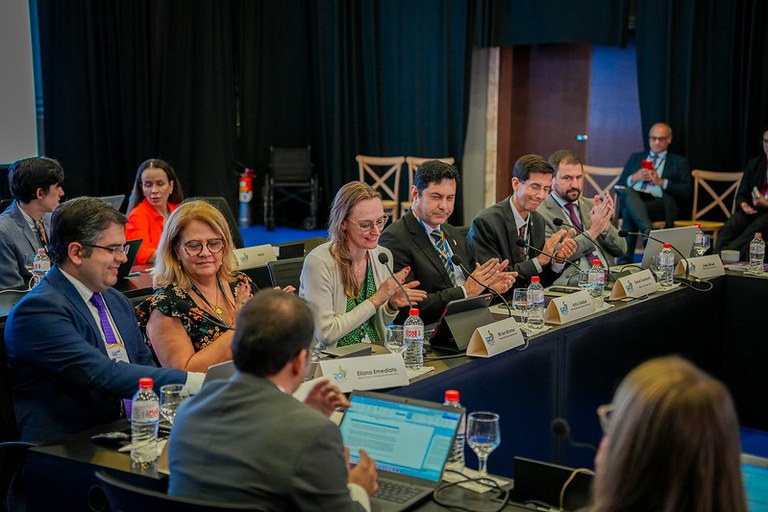Notícias
INTERNATIONAL
ANPD holds side-event to the 3rd G20 Digital Economy Working Group Meeting

Event gathered Brazilian and international specialists to debate the role of data protection in digital economy (Photo: Shizuo Alves/Mcom).
On Wednesday (12), the Brazilian National Data Protection Authority (ANPD) held the conference Navigating Data Protection in the G20 Digital Economy Agenda, a side-event to the 3rd Meeting of the G20 Digital Economy Working Group (DEWG). The goal of the meeting was to promote the protection of personal data as a cross-cutting topic for the working group's four priorities of this year (meaningful connection; public digital infrastructure; information integrity; and artificial intelligence).
The conference had an opening speech, two panels and a conclusion session. Participants included representatives from the Authority, the working group's engagement groups and other Brazilian government bodies. The program also included speeches from foreign delegations and the other G20 troika countries (India and South Africa).
In his opening speech, ANPD's Vice-President, Arthur Sabbat, emphasized the relevance of the working group for the future of people. "By integrating the initiatives of the ANPD and the Federal Government with the global efforts of the G20, we can ensure that the digital economy continues to grow in a sustainable way, benefiting all citizens and promoting a more informed and protected society," he said.
As part of the opening speeches, Rajesh Kumar, representing the Government of India, recalled that data protection has been dealt with at the G20 since 2016. "Data protection is a fundamental pillar for trust in the digital economy. The issue is fundamental both for boosting the economy and innovation and for guaranteeing human rights," he explained.
After the opening session, the audience followed the first panel, Media and Information Literacy and Data Protection, with a presentation by Thiago Tavares, from the organization SaferNet Brasil, on digital security and data protection for children and adolescents. "One of the biggest challenges we face today in Brazil is the spread of disinformation, hate speech and cyber threats aimed at vulnerable groups such as children, adolescents and the elderly," he explained.
After the presentation, representatives of the engagement groups made their contributions, as did the European Union delegation. "We want to ensure that data flows with confidence. For this to happen, we need to engage multiple actors in the process and make it transparent," said the European Union delegate.
The second panel, Experimental Regulation and Data Governance, featured a presentation by Armando Guío, from Network of Centers. The expert, who collaborated with the Authority's Artificial Intelligence Regulatory Sandbox, defended, among other points, the importance of sandboxes to promote responsible innovation in the area.
After further interventions by authorities and engagement groups, the Singaporean delegation shared some of the country's experience with this model. "Although there is the challenge of bringing the public and private sectors closer together, sandboxes are important tools for promoting responsible technological development," the delegate explained.
In her closing remarks, ANPD director Miriam Wimmer reiterated the cross-cutting nature of personal data protection. "Data protection cuts across various aspects of the digital economy. In order for data governance to be strong, multiple actors must be involved, and the public and private sectors must be brought closer together," she said.
Jeanette Morwane, a delegate from South Africa, was also part of the closing remarks. "Data protection must be developed in a standardized way. In addition, all countries must be able to develop their own skills and solutions," she said.
Also taking part in the conference were Daniel Brandão, from the Ministry of Communications; Eliana Emediato, from the Ministry of Science, Technology and Innovation; Nathalia Lobo, from the Ministry of Justice and Public Security; João Brandt, from the Secretariat of Social Communication of the Presidency of the Republic; and Luanna Roncaratti, from the Ministry of Management and Innovation in Public Services.
The C20, T20, W20 and B20 engagement groups were represented by Cynthia Picolo, from the Public Policy and Internet Laboratory (LAPIN); Fernanda Martins, from InternetLab; Camilla Achutti, from Mastertech; Andriei Gutierrez, from Kyndryl Brasil; Pedro Martins, from Data Privacy Brasil.

